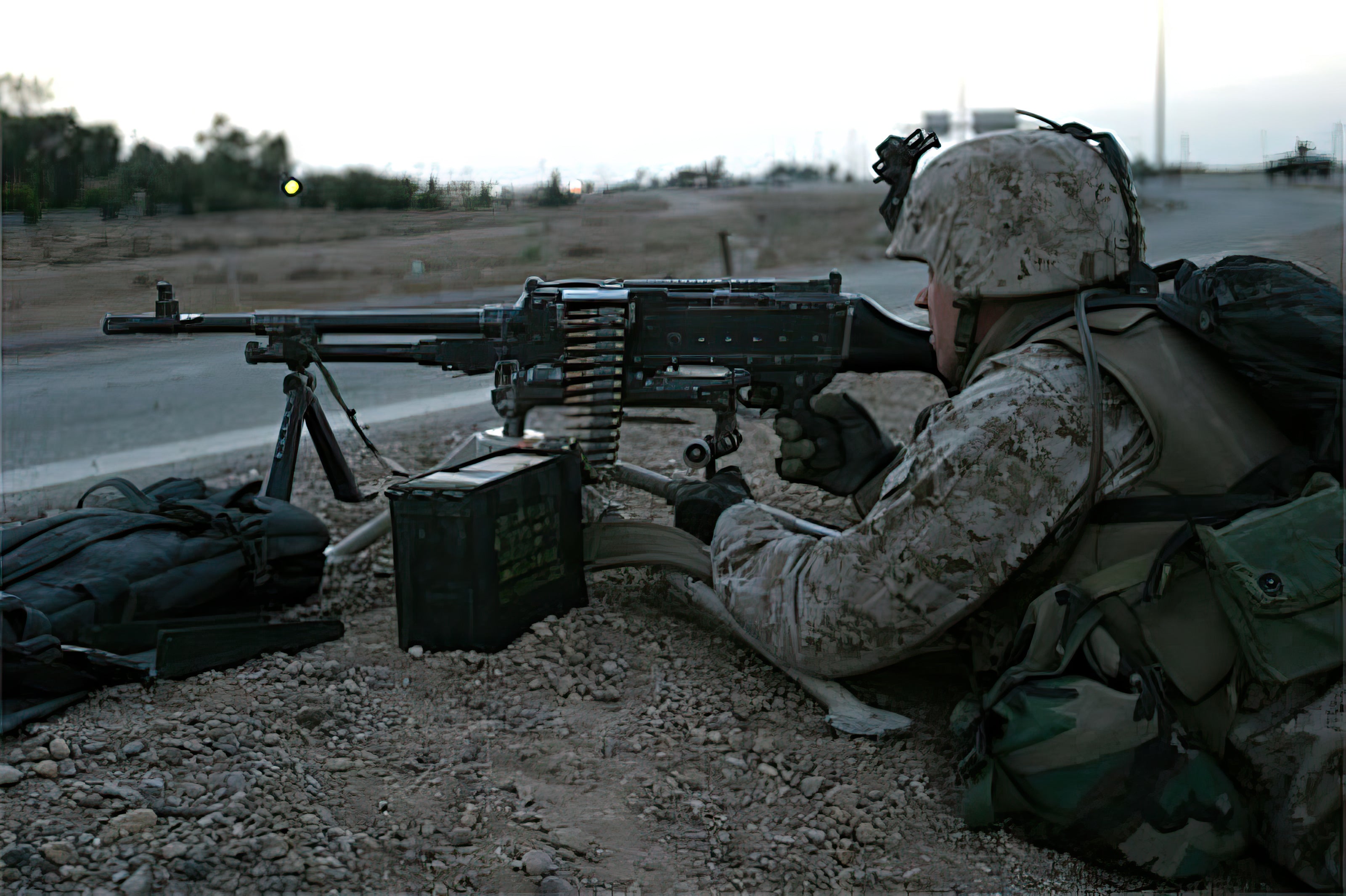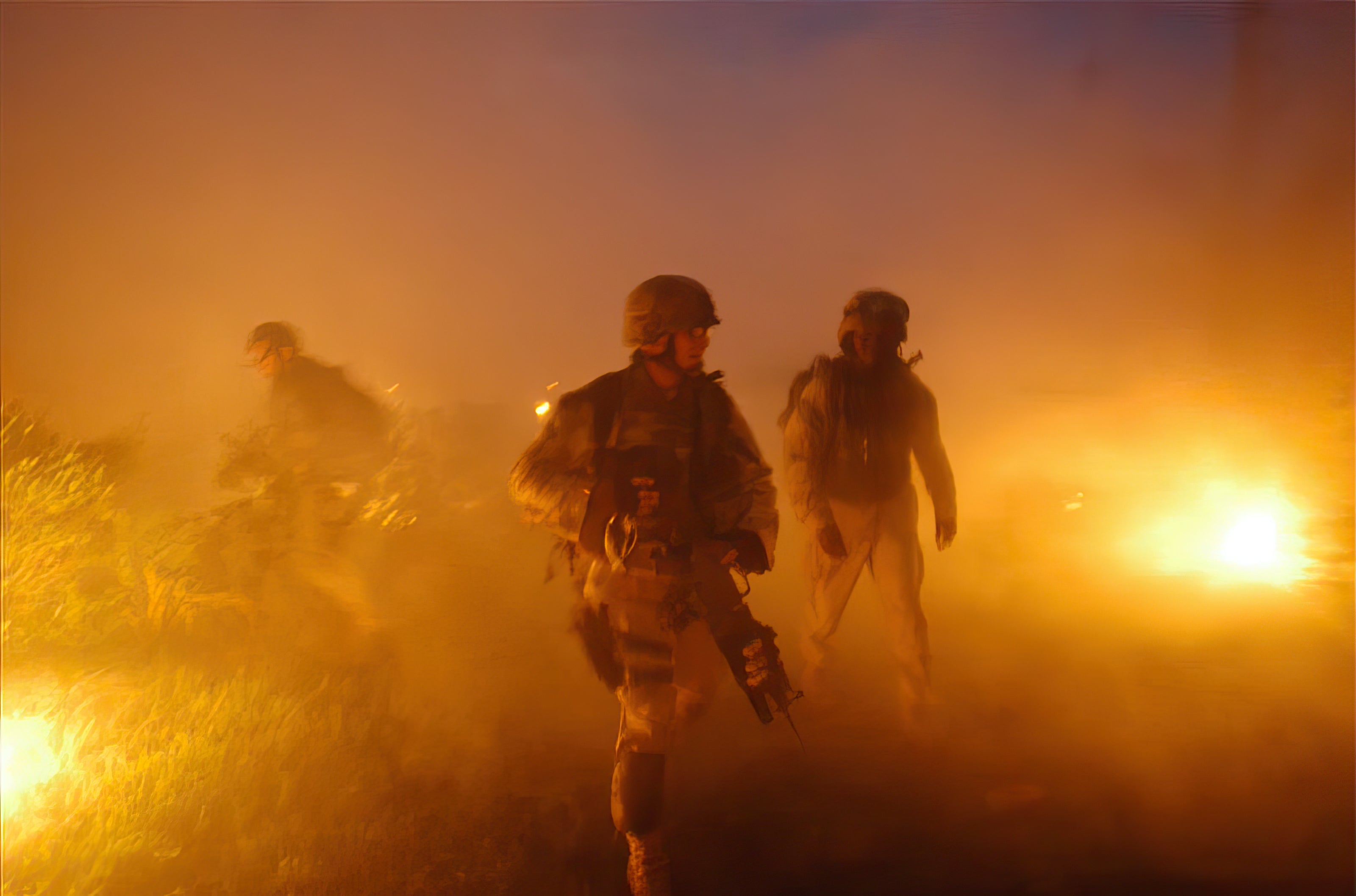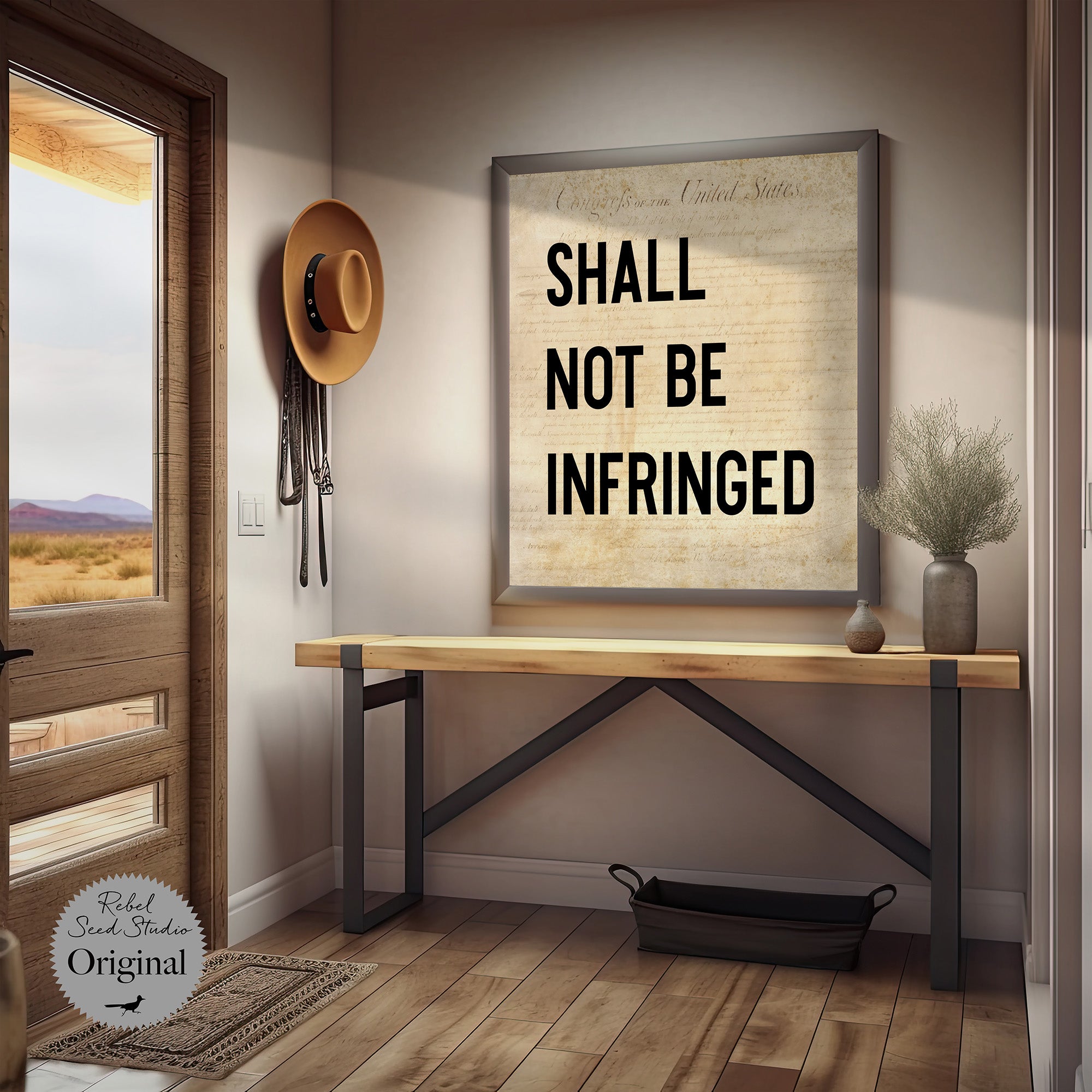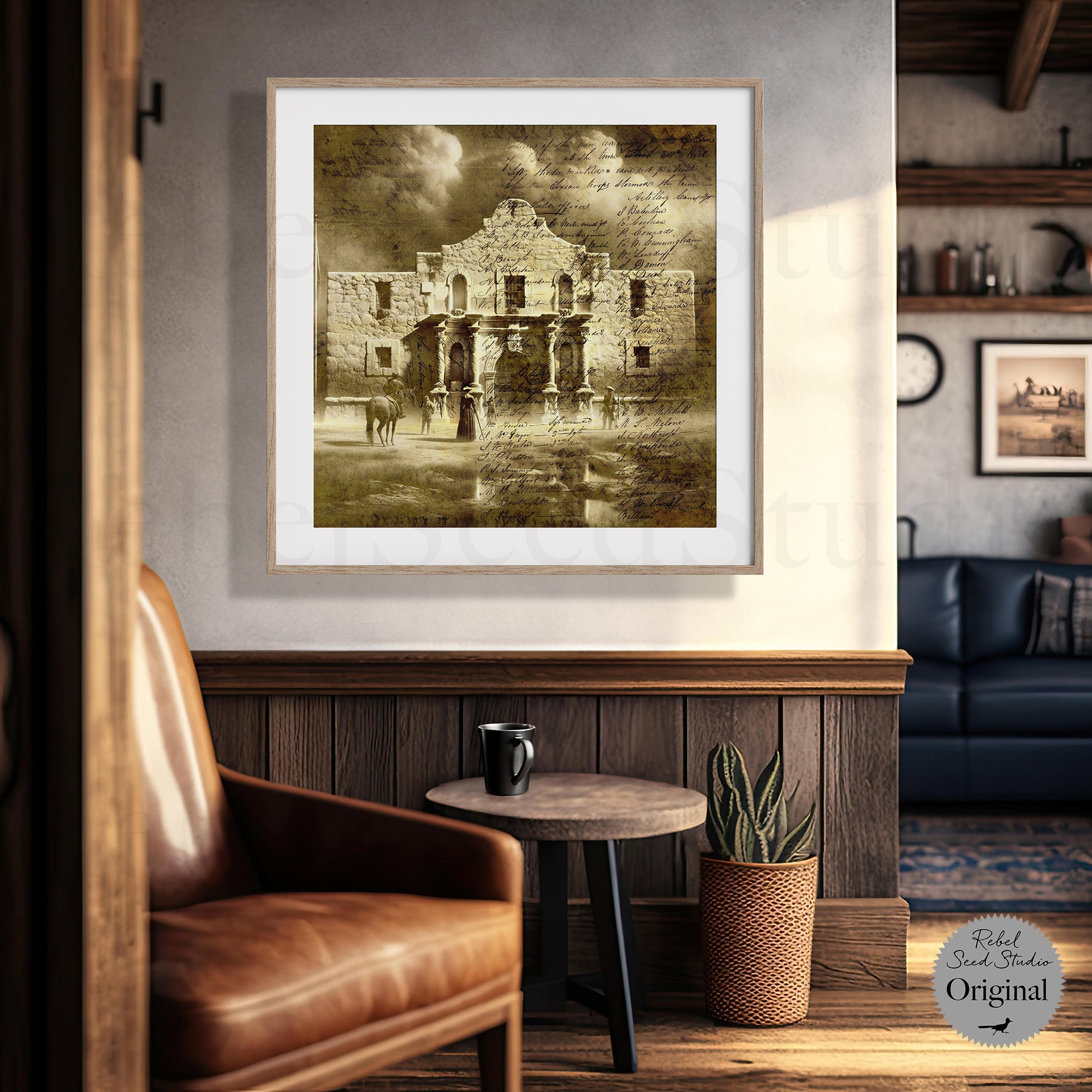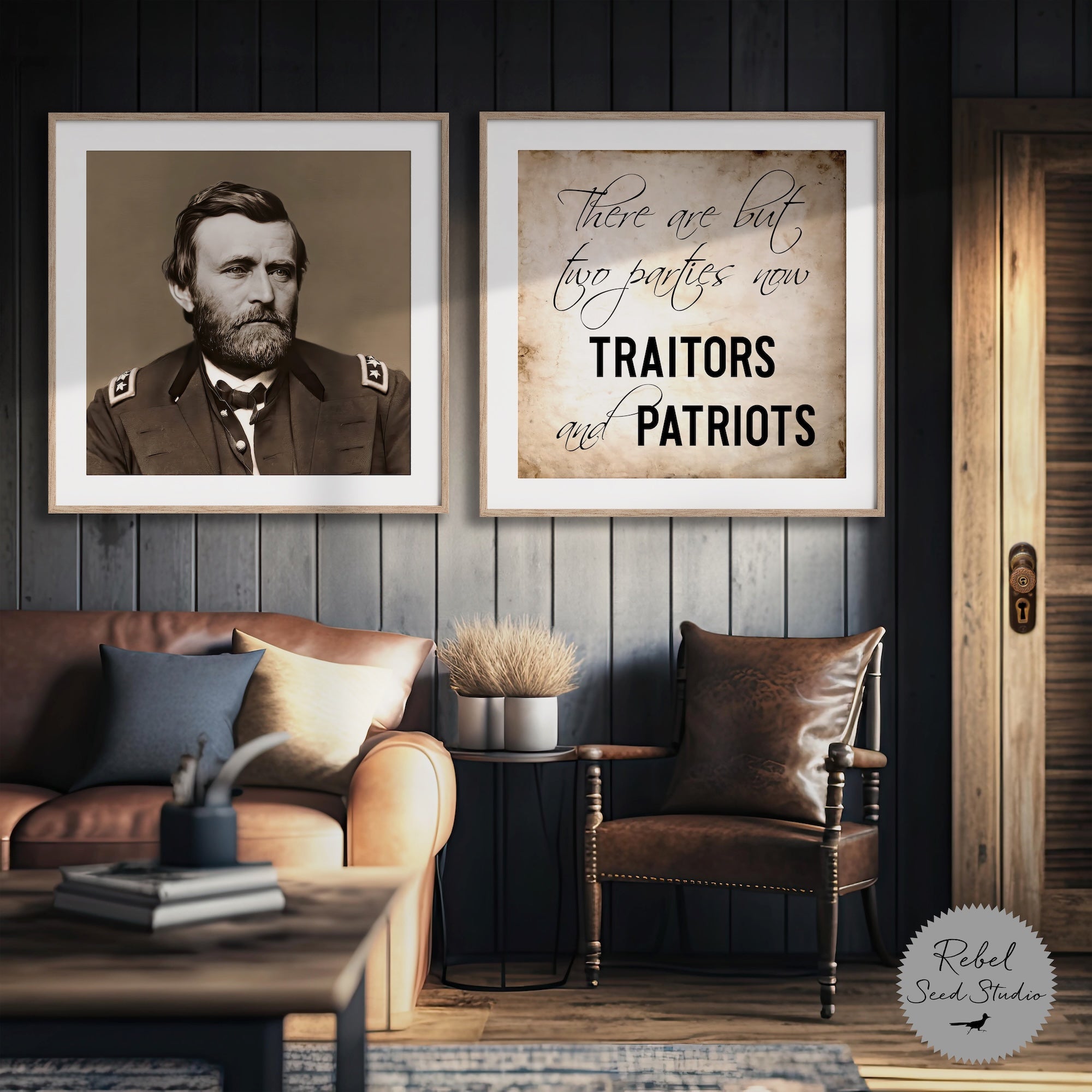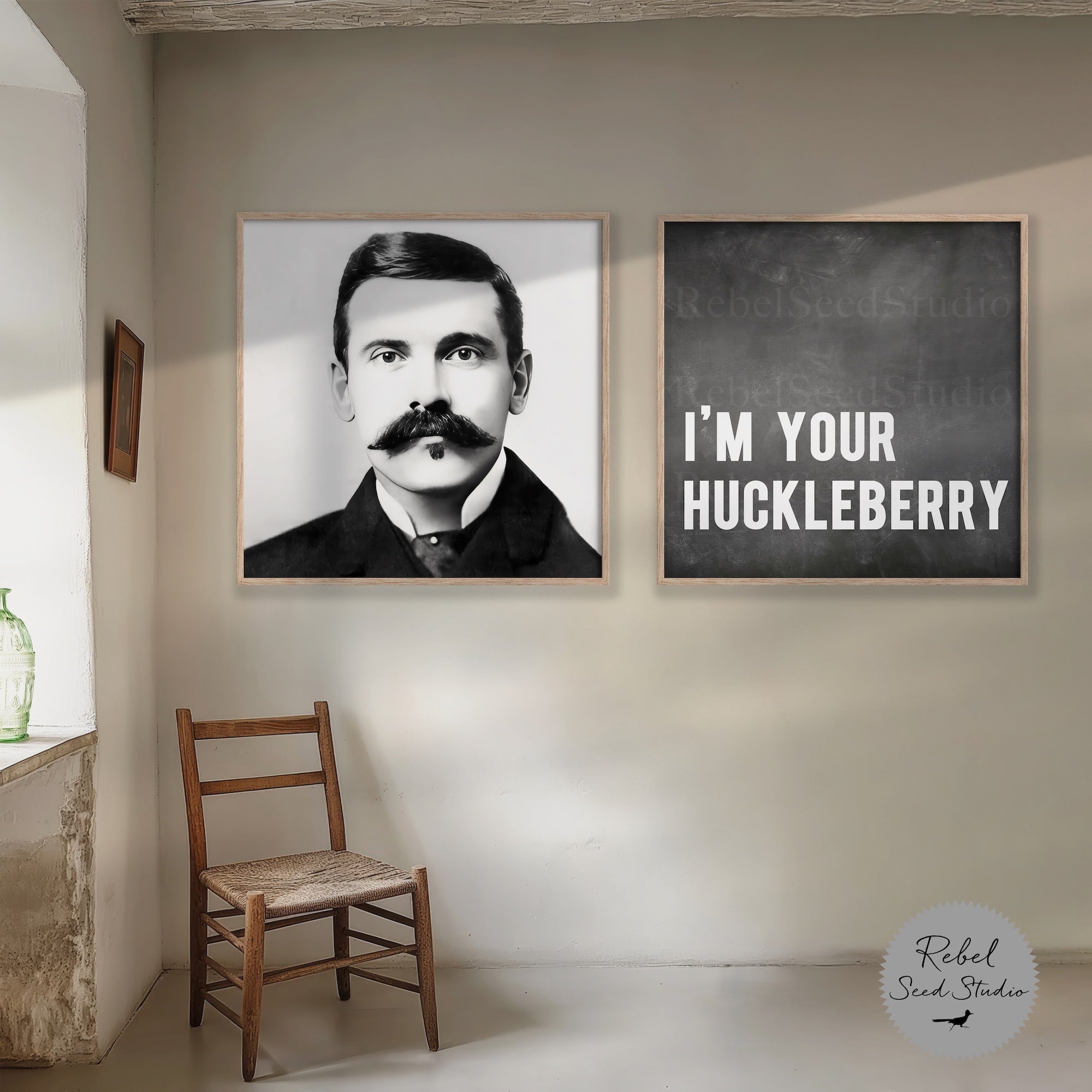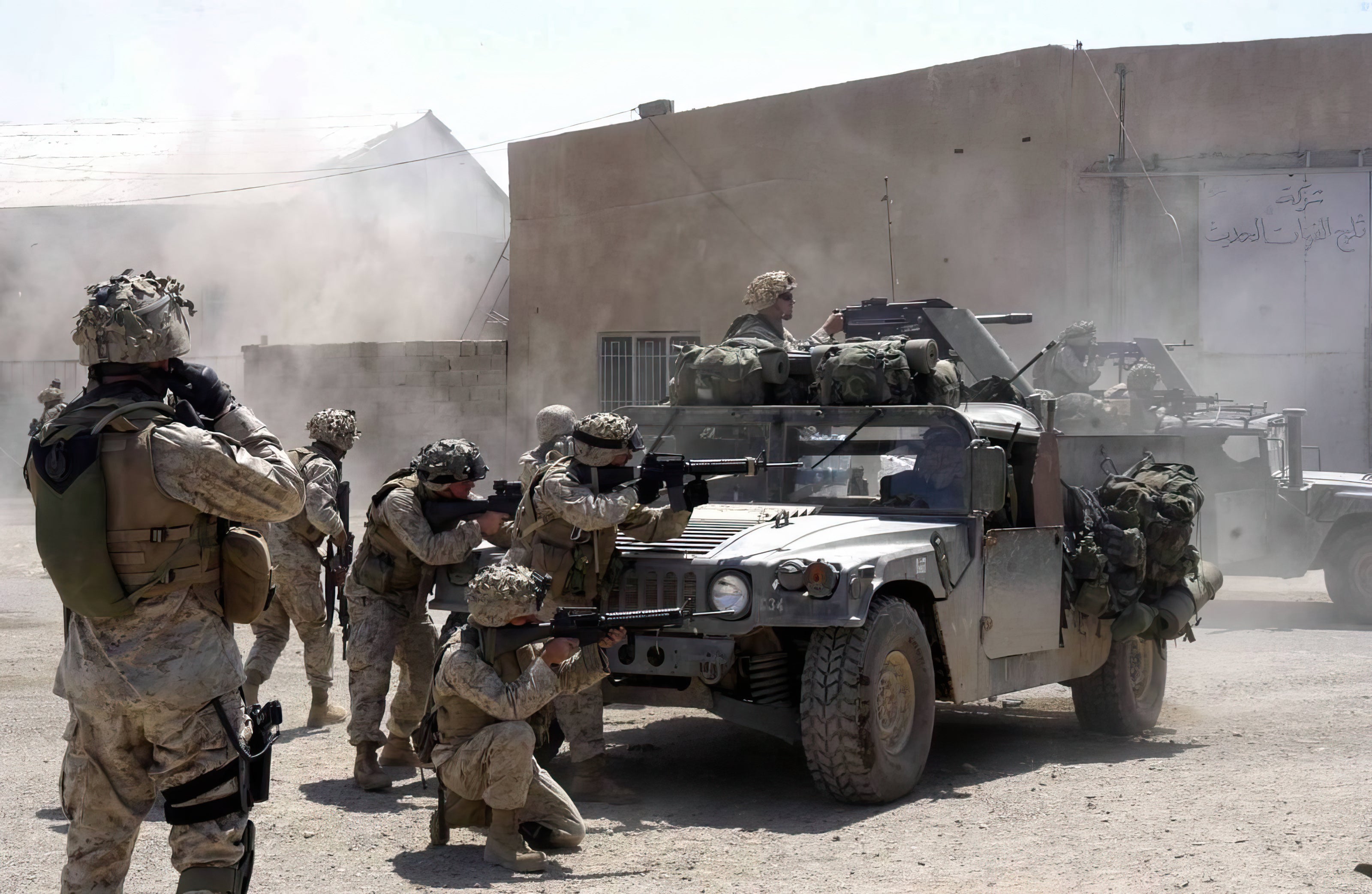
Battlefield Fallujah - Episode 1: Blackwater
After four Blackwater contractors are killed in Fallujah, U.S. Marines and soldiers move into the city to hunt down the murderers.
Blackwater Bridge - March 31, 2004
The morning traffic surged along the six-lane divided highway in typical Iraqi fashion, every driver for himself. A five-vehicle convoy—made up of three empty Mercedes Benz flatbed trucks and two Mitsubishi sport utility vehicles—struggled to maintain contact in the hodgepodge of cars and trucks weaving in and out of their motorcade. A checkpoint appeared. The procession stopped while a bored Iraqi police officer inspected the vehicle occupants. The driver of the lead Mitsubishi, Wes Batalona, an American employee of Blackwater USA, the security contractor, chatted briefly with the officer before being allowed to proceed. His passenger, Scott Helvenston, another Blackwater member and former SEAL, scanned the immediate area, alert for signs of trouble. The three flatbed trucks with the Mitsubishi bringing up the rear passed through without stopping.
The vehicles proceeded through the center of town, past the Mayor’s Complex and police headquarters. After passing through the main intersection, they turned left and proceeded west toward the Euphrates. The heavy traffic caused the convoy to become separated. The lead sport utility vehicle and two flatbeds were in the left lane, while the third flatbed and the other Mitsubishi stayed to the right. A roadblock appeared—a dark Mercedes 300, a tan Opal sedan, and a white pickup truck with a double cab—forcing the convoy to stop. Several Iraqi youngsters approached the lead vehicle. Scott Helvenston rolled down the tinted window and talked briefly to one of them. Two of the other boys walked over to a large group of Iraqi men on the sidewalk. Suddenly, several armed men ran from the doorways of the shops and took the rear Mitsubishi under fire, shattering the side windows. The two American occupants, Mike Teague and Jerry Zovko, were killed instantly. Their vehicle rolled to a stop beside the last flatbed truck in the convoy.
Wes Batalona grasped what was happening and attempted to make a U-turn across the median. He gunned the vehicle but was blocked by oncoming traffic and raked by a deadly burst of automatic-weapons fire. His vehicle rear-ended another and came to a stop. One of the assailants filmed the ambush with a video camera. The tape, later shown on Al Jazeera television, showed Batalona slumped to the right, almost on top of Helvenston. One of the gunmen reached in and grabbed an M4 carbine that was wedged between Batalona and the door. Another tugged a weapon free from around Helvenston’s neck. The gunmen then fled.
A large crowd quickly gathered. It was estimated that more than 300 men and boys swarmed around the vehicles chanting anti-American slogans and shouting, “Allahu akbar,” God is great. An account said that one of the badly wounded occupants staggered from a vehicle and fell to the ground, where he was kicked, stomped, and stabbed to death. Several Middle Eastern news crews arrived and began filming the mayhem. Their arrival seemed to further incite the crowd. An Iraqi boy threw a jug of gasoline on the vehicles and set them on fire, sending a plume of black smoke into the air. When the fires died down, the bodies of the slain Americans were pulled from the smoldering vehicles and desecrated. Two of the charred remains were then dragged behind a car past hundreds of cheering men to a green trestle bridge on the outskirts of town and strung up.
Within hours, the shockingly graphic image of cheering Iraqi men, with the charred bodies hanging from the trestle behind them, appeared on Arab television. Al Jazeera broadcast the bloody scene to millions of Arabs throughout the Middle East. The international news organizations picked up the story. The grisly photographs were soon emblazoned “above the fold” in many of the world’s most influential newspapers. In the United States, the three main broadcast networks all began their Wednesday evening newscasts with video of the grisly aftermath of the attack. ABC and CBS television showed the bodies being pulled out of the burning vehicle, hacked apart by angry Iraqis, dragged behind a car, and strung up on a bridge. NBC edited the pictures, but the corpses were still visible.
President Bush was reported to be outraged. His press secretary Scott McClellan said in righteous indignation, “It is offensive. It is despicable the way these individuals have been treated.” Lieutenant Gen. Ricardo Sanchez, in charge of coalition forces in Iraq as commander of Combined Joint Task Force 7, wrote that “there was a flurry of communications—telephone calls, e-mails, and video teleconferences—all to sort out the coalition’s response to Blackwater.” He indicated that Donald Rumsfeld, secretary of defense, was particularly forceful. “We’ve got to pound these guys,” Rumsfeld said. “This is also a good opportunity for us to push the Sunnis on the Governing Council to step forward and condemn this attack, and we’ll remember those who do not. It’s time for them to choose. They are either with us or against us.”
In Baghdad, Ambassador Paul Bremer, the Coalition Provisional Authority’s (CPA) chief, declared “Yesterday’s events are a dramatic example of the ongoing struggle between human dignity and barbarism. The acts we have seen were despicable and inexcusable. They violate the tenets of all religions, including Islam, as well as the foundation of civilized society. Their deaths will not go unpunished.” Brigadier General Mark Kimmitt, deputy operations director for the Joint Task Force in Iraq, stated, “We will hunt down the criminals. We will kill them or we will capture them and we will pacify Fallujah.”
Understanding Fallujah
Fallujah is located approximately 43 miles northwest of Baghdad, just east of Ramadi, the provincial capital of al-Anbar, the largest of Iraq’s 18 provinces. Al-Anbar borders Jordan and Syria in the west and Saudi Arabia in the south. Most of its inhabitants are Sunni Muslim. Fallujah itself is situated on the east bank of the fertile Euphrates River, on the ancient crossroads of the Silk Road, Iraq’s oldest and most important commercial artery. The Silk Road, current day Highway 10, connects Saudi Arabia with Syria and Turkey, and Baghdad with Amman, Jordan. The city’s location made it a hub for commerce and trade, both legal and illegal—a waystation for merchants, smugglers, and thieves crossing the desert.
Fallujah is known as the “City of Mosques,” because of its 100 green-domed places of worship, and is located within the so-called “Sunni Triangle,” a swath of densely populated territory north of Baghdad where the majority of its inhabitants are Sunni Arabs. Roughly triangular in shape, the Sunni Triangle encompasses the major cities of Baghdad, Fallujah, Ramadi, Samara, and Tikrit, Saddam Hussein’s birthplace. Ramadi anchors the west base line, with Baghdad on the east and Tikrit in the north. Each side measures approximately 125 miles long.
In 1947, Fallujah’s population was 10,000. With the influx of oil revenue, the development of industry, and its location on Highway 10, Fallujah grew rapidly. By 2003, its population was estimated to be between 250,000 to 350,000, equivalent to the size of Raleigh, North Carolina. Fallujah contains more than 50,000 densely packed buildings laid out in 2,000 city blocks, averaging 100 by 200-meters on a side.
Mike Tucker, in Among Warriors in Iraq: True Grit, Special Ops, and Raiding in Mosul and Fallujah, wrote, “Fallujah has been the base for smugglers who trade in illicit goods of all size, kind, and make, from Syria and Jordan to Iran on the west-to-east route, and from Saudi Arabia to Turkey on the north-south route.” It is a place where the sheiks and imams take their cut of the illegal trade and viewed the coalition force as a threat to their continued prosperity. One of the most powerful imams in Fallujah after the fall of Hussein was Sheik Abdullah al-Janabi, an anti-coalition cleric who preached holy war against the Americans. Another powerful leader in the insurgent movement, Omar Hadid, headed the local branch of Jordanian-born militant Abu Musab al-Zarqawi’s organization. Hadid, a former electrician, was a brutal, ruthless killer who organized an anti-coalition unit called the Black Banners Brigade, composed mostly of Syrian fighters.
Fallujians practice extreme Wahhabism, a radical religious philosophy that preaches nontolerance of infidels (anyone not Wahhabi), preaches jihad against coalition forces, and martyrdom in the name of these goals. Wahhabism gained strength among the Sunni after Hussein’s fall. The city’s imams characterized the Shia as infidels. Foreign terrorists such as Zarqawi exploited this schism between the two sects in an attempt to drive them into open civil war.
This conservatism contributed to the city’s aversion to secular authority, particularly the occupation of foreign troops. On the evening of April 28, 2003, Saddam Hussein’s birthday, a raucous crowd of about 250 residents marched to protest the American presence. According to the soldiers, they came under attack from gunmen in the crowd. A local Muslim cleric countered, “It was a peaceful demonstration. Fifteen residents were killed and several dozen wounded, including women and children. There were no American casualties." Al Jazeera quickly reported that the soldiers were unprovoked and shot indiscriminately. The Arab media followed up with a drumbeat of other anti-American stories.
The shooting inflamed the Sunni population, many of whom traced the beginning of the resistance to the incident. Fallujah quickly became a mecca for anti-American insurgents. Sniper, random shootings, and improvised explosive device (IED) attacks increased, which coalition spokesmen claimed were instigated by foreign fighters.
In May, Bremer’s CPA issued two orders: one disestablishing the Ba'ath Party and the second one formally disbanding the Iraqi Army, which put thousands of men on the street, with no jobs, an uncertain future, and a simmering desire for revenge against the foreign interlopers. Ali Allawi, an Iraqi cabinet minister, wrote, “The twin orders of de-Baathification and the dissolution of the army were seen as the vital ingredients that launched the insurgency ...” Lieutenant Colonel Clarke Lethin, 1st Marine Division’s operations officer, stated bluntly, “We would have been better off if the CPA hadn’t shown up.”
It was estimated that at one time, there were over 70,000 unemployed men in the city, a large pool of manpower for the resistance. They had access to an almost unlimited supply of weapons. Intelligence sources indicated that up to 15,000 of them did just that by using the huge stockpiles of weapons and explosives left from the war. The U.S. Army estimated that nearly one million tons of arms and ammunition had been stockpiled around the country, in mostly unguarded facilities, free for the taking. Former Iraqi army veterans provided the insurgents with expertise. Within a short time, IEDs were taking a heavy toll, and the Sunni insurgents were targeting American forces, local tribal leaders, and Iraqi government representatives. There was a long series of bloody encounters.
Ambassador Bremer was concerned that the military was not doing enough to combat the insurgency and was giving the impression that they were “ceding towns like Fallujah to the enemy.” After suffering several casualties from IEDs and confronting a hostile population, the American attitude seemed to be let’s “kick ass and take names, these people are used to force and don’t understand much else.”
According to Bremer, the religious leadership of the city supported the violence. Abu Mohammed, a former officer in the Iraqi Army, said, “The influence of the mosques is great and widespread. After the war ended, we expected things to improve, but everything became worse, electricity, water, sewage... so mosque speakers openly spoke of jihad and encouraged people to join it.”
Abdullah al-Janabi openly called on Iraqis to join in a holy war against the Americans. He exhorted them to fight, telling them that those who died fighting Islam’s enemies would be rewarded with eternity in paradise. The mosques became the rally point for the faithful—and also arms depots and ammunition storage places—despite Law of War prohibitions against the practice. Mohammed declared, “There is no law in Fallujah now, it’s like Afghanistan... rule of gangs, mafias and Taliban.”
The insurgency in Fallujah was a jumble of loosely cooperating groups with complementary agendas that were brought together by a common enemy. It was a marriage of convenience. The first group was the disgruntled Former Regime Elements (FRE), who were members of Saddam Hussein’s Ba'ath Party, Iraqi soldiers, and remnants of the Fedayeen Saddam, a radical paramilitary group. Rumsfeld called them “deadenders.” They feared being politically marginalized and were clearly opposed to the coalition and any new government that took away jobs and their source of livelihood. For the most part, they were hometown functionaries with close ties to the local tribes. They were deeply committed to the insurgency and, in the case of the former security service or army personnel, provided military expertise and training.
The second group consisted of foreign fighters principally from Syria, Saudi Arabia, Iran, and Jordan. The most famous of these fighters was Abu Musab al-Zarqawi, a Jordanian, whose network came to be known as al-Qaeda in Iraq. His goal was to create an Islamic state within Iraq that would support al-Qaeda's activities throughout the Middle East. The foreign fighters were generally well trained, well financed, and indoctrinated with a religious fervor, which inspired them to commit murder in the name of jihad (holy war for religion). The third group comprised criminals and malcontents, who were more opportunists than committed insurgents. They saw the conflict as a way to profit. The three groups did not share long-term goals but rather came together for convenience.
The Arrival of the Marines
On March 24, 2004 the I Marine Expeditionary Force (I MEF), under the command of Lt. General James Conway, assumed responsibility for al-Anbar Province, relieving the army’s 82nd Airborne Division and the 3rd Armored Cavalry Regiment. Conway’s Marine Air-Ground Task Force (MAGTF) consisted of 25,000 men and women from the 3rd Marine Air Wing, 1st Force Service Support Group (FSSG), and the 1st Marine Division. Conway established three major operational goals: security and stability operations (SASO), information operations (IO), and civil affairs (CA). He reiterated that I MEF’s primary focus was on providing security and a better quality of life for the Iraqi people.
Captain Theodore Bethea, company commander, Charlie Company, 1st Battalion, 8th Marines, explains how the Marines are able to successfully conduct a multi-goal operation among the danger and obstacles inherent in such a mission: "I think the Marines understand the enemy, and that is the whole key to being able to adapt and adjust with the variety of missions that come down. They have faced the enemy, the have defeated the enemy, and they understand his intent; which is to try to alienate us from the Iraqi people that we are here to serve and to facilitate a democratic way of life towards. And so, they realize that when we conduct operations like humanitarian patrols, or security patrols, that he’s going to take every opportunity to try to disrupt that type of operation. And they know they need to be able to flip the switch and go into fire movement, fire maneuver, when and if the enemy gives us that opportunity to do so. And, they realize that every time they leave the wire, it’s a combat operation, regardless of the level of war that it may be perceived to be upon the initial brief and the order."
Two days before the formal change of command, Conway met with Bremer and told him, “People out there are about to learn the meaning of the Marine Corps watchword, ‘No Better Friend, No Worse Enemy.’”
By working closely with the local representatives, I MEF hoped to have, by summer, a smooth transition to Iraqi political, administrative, and social control. The plan envisioned building trust as a basis for restoring stable conditions.
1st Lt. Christopher Conner, company XO, Charlie Company, 1st Battalion, 8th Marines, understood the benefit of working with local forces to engage with civilians: "The mission is to give this country back to its people, to give them a chance to determine their own destiny. And, through all the patrols we've been on before with just us, you know, it was hard for us to see us doing any good because we never got anything back from them. We never got any communication of 'Hey, you know we need this, we want this, or this is what we're afraid of'. All of a sudden with this Iraqi Platoon right there beside us, they were making conversation. They were engaging with the people, and they were finding out what those people really wanted and what they really feared."
I MEF hoped to establish a working relationship with the local police to develop an intelligence network to eliminate the insurgent infrastructure. The 1st Marine Division (nicknamed Blue Diamond after its distinctive insignia) was I MEF’s primary force to implement the plan.
Colonel Joseph “Joe” Dunford, 1st Marine Division: "We had battalions spread out from Al Kut, in the north, Nasiriyah, in the south, Najaf, Karabala, Northern Mobile, I mean the entire south of Iraq, less the southeast portion, was in the responsibility of 1st Marine Division. Quite honestly, when we left, after OIF I, it was with a pretty fair degree of optimism that things were going pretty well. I think each of the commanders could point with some pride as to the accomplishments and the progress they were making."
Dunford attended a briefing by Major General James Mattis, who outlined a vision and resources to create a different approach, which was characterized by the news media as “winning the hearts and minds” of the Iraqis.
Jim Mattis was an unorthodox strategist. According to Major General Robert Scales, former commander of the Army War College, “He was the product of three decades of schooling and practice in the art of war. No one on active duty knows more about the subject. He is an infantryman, a close-combat Marine. He is one of those few who willingly practices the art of what social scientists term ‘intimate killing.’”
Mattis is a voracious reader. It is reported that at one time his personal library contained over 7,000 books. He studied ancient as well as modern military campaigns and was comfortable discussing Hannibal or Rommel. Mattis was a quick study, one who could grasp the essentials of a complex issue and boil it down to its simplest terms. A friend asked him how he was able to maneuver the 1st Marine Division’s multiple attack on Baghdad. He replied, “I visualized the battlefield.”
Major General James Mattis: "You have to assume you must keep improving. If you make that your decision, that you must improve, if you look at every week in the Marine Corps as your last week of peace and you must be better at the end of this week as a war fighter, you'll push yourself that, when the things are going tough in the field, you keep your spirit up and you're the man everyone can turn to knowing that you don't give up. And, you just keep improving every day with the assumption that, if you're going to lead more Marines in the future as you get promoted, they expect you to be the physically toughest, the mentally sharpest, and spiritually just the most undiminished person that nothing, not cold, not rain, not enemy situation, not frustrating rules can get you down. And you just maintain this body, mind, and spirit improvement at all times. You stay teachable most by reading books, by reading what other people went through.
I can't tell you the number of times I looked down at what was going on, on the ground, or I was engaged in a fight somewhere, and I knew, within a couple of minutes, how I was gonna screw up the enemy. And, I knew it because I had done so much reading. I knew what I was going to do because I had seen other similar situations in the reading. I knew how they'd been dealt with successfully or unsuccessfully. And, so long as you continue along this line, so long as you remember, somebody on the other side is watching, hoping that you're not at the top of your game, that you're not reading, that you're not working out, that you're not strong spiritually, then they're going to think they've got you. You want to always be the toughest, the sharpest out there."
Mattis encouraged his staff to think “out of the box.” He was determined to try something different. The division reached out for nonmilitary resources - academics and experts in counterinsurgency, retired Vietnam-era combined action platoons (known as CAP), Marines who lived among the villagers and taught them self-defense, and even the Los Angeles Police Department.
The division’s Marines were trained to be culturally sensitive. Mattis explained, “We want to create Marines who could read the cultural terrain as well as the physical terrain.”
He urged his men to show respect—remove sunglasses when interacting with Iraqis, learn simple Arabic phrases, grow mustaches—and exercise restraint in the use of deadly force, stating: “knock on doors, not kick the door down and put a boot on a man’s neck.”
“Remember,” he told them, “Iraqis aren’t your enemy, don’t let the insurgents make you think that. The people are the prize.”
Marine Major David Banning, a division staff officer, thought, “The (Army) soldiers’ attitudes towards the Iraqis and how they dealt with them were different than what General Mattis had emphasized."
Marine Colonel Michael "Mike" Shupp: "I could see the developments of the Marine forces getting ready to deploy, and I heard the discussions about ‘No better friend, no worse enemy’. And, the Marines were gonna take a new approach. There was a lot of concern on Capitol Hill that the Marine Corps thought that they had a better idea. And the Army, people that I knew in country, and people that I knew on Capitol Hill, were saying what are the Marines talking about? Don’t they understand what’s going on inside of theater? There was a serious disconnected that existed between the Marine forces that were coming in and the forces that were in the States. And I was very concerned about that. When I came over here, it was more of a fight than anything, and the ‘No better friend’ was still there, but it was taking less of a role, it was ‘No worse enemy’."
Colonel Joe Dunford (later promoted to Brigadier General) felt the change from Army to Marines was an opportunity to demonstrate to the Iraqis that things would be different: "Clearly, all of the leaders in the division, all of the Marines in the division recognize that this could be seen as a time of opportunity. We could advertise ourselves as the new guys coming in and establishing a new relationship... and make a fresh start."
The Marines were prepared to jump-start various infrastructure projects—repair schools and irrigation systems, provide fresh water, remove trash—and improve the quality of life.
Colonel Joe Dunford: "We did look for things to do that were important to the local people that hadn’t been initiated."
As the time for deployment approached, the division issued an order titled “Fallujah Opening Gambit”. It outlined a measured, phased approach: kinetic operations combined with focused informational operations and civil actions to show the Fallujians the “carrot and the stick.” They can be summarized in two broad categories:
#1 Civic Action
- Interacting with local tribal, administrative, and religious leaders.
- Distributing school, medical, and children’s recreational supplies.
- Meeting with local governing councils to build rapport and gain credibility.
- Integrating the actions of the Combined Action Program units in order to enhance Iraqi confidence and support.
- Diminishing Iraqi populace support for or tolerance of anti-coalition forces.
- Reducing Iraqi unemployment by creating public-sector jobs as rapidly as possible and establish job security.
- Increasing effectiveness of public services and local governing bodies.
- Developing Sunni advisor program.
- Initiating former Iraqi military engagement program. Using “veteran’s points” to bring former military to the forefront of employment and reducing adversarial relationships with them.
- Coordinating and disseminating IO message to introduce Marines to the local populace and gain information superiority.
#2 Kinetic Operations
- Conducting patrols to include emphasis on joint patrols with Iraqi forces in order to build confidence and assess their abilities.
- Increasing effectiveness of Iraqi security forces to include the police, Iraqi Civil Defense Corps, highway patrol, border patrol, and Facility Protection Service by providing basic/advanced training, close integration into our formations, and supervision.
- Defeating anti-coalition forces in coordination with Iraqi forces.
- Disrupting enemy infiltration of Iraq through overland movement or movement along waterways. Special attention will be paid to the border regions to disrupt the introduction of foreign fighters, with an initial emphasis on the Syrian border, avoiding adversarial relationships with legitimate smugglers who may be able to assist us.
Mattis worked tirelessly throughout this period to ensure his division was ready. Colonel Clarke Lethin recalled, “The general [Mattis] talked to every Marine in the division at least three times... he wanted to talk them through, and image them through, the issues they would face. He wanted to talk about morality on the battlefield, how to go through an ambush one day and have your buddy blown up, and then face Iraqis the next day.” Mattis emphasized, “We will be compassionate to all the innocent and deadly only to those who insist on violence, taking ‘no sides’ other than to destroy the enemy. We must act as a windbreak, behind which a struggling Iraq can get its act together.”
The Vortex of Violence
After watching the video feed of the Blackwater butchery, Dunford radioed Mattis, who was out in the field with one of the outlying units. “A mob in Fallujah has killed some American contractors,” he said over the encrypted net. “It looks like a scene from Somalia.”
“What’s your take?” Mattis asked bluntly.
“The contractors are dead,” Dunford responded. “If we go in to get their bodies, we’ll have to kill hundreds, including kids. Captain Sullivan [1st Marine Regiment’s liaison officer with the city and fluent in Arabic] says the police chief promises to return the bodies.”
“Where does the MEF stand?” Mattis asked.
“General Conway thinks we should let the mob exhaust itself,” Dunford replied. “I recommend we stay out.”
“That’s it then,” Mattis decided, “rushing in makes no sense.”
Doug Zembiec, who had, just two days before, fought a pitched battle in the city, said righteously, “They can’t do that to Americans!”
Drumbeat for Action
The Blackwater incident was the proverbial straw that broke the camel’s back. According to Sanchez, there was a “Steady drumbeat from Washington to take swift action” despite Marine objections. According to George Packer in The Assassins’ Gate: America in Iraq, “President Bush declared, ‘I want heads to roll.’”
Sanchez directed I MEF to take action. The die was cast. Author and military veteran Bing West reported that Sanchez told his staff to write an order for the Marines to attack.
The decision did not allow enough time for the evacuation of civilians, gathering of intelligence, or constructing an effective public relations campaign to counter the expected media fallout from attacking a Sunni city. Jim Mattis was livid. The order to attack Fallujah was, in his view, irresponsible.
Colonel Dunford stated, "The best we can hope for in Fallujah is not to lose. Not to have an emotional jihad uprising because of something we do or to let it fester as an insurgent base.” He then prophesied, “Americans will never be welcome there.”
Sending in a limited force into a city of 250,000 people was ludicrous, Mattis thought. It would not only create insurgents and negate all the division’s careful civil-military relations planning, but it would not guarantee the apprehension of the perpetrators. He felt, with time, the division could apprehend or kill them by using special forces or SEAL teams because Iraqi informants inside the city had already supplied the division with the photographs, names, and addresses of the killers.
Mattis’s carefully thought out plan encompassed building goodwill in the surrounding villages, concentrating on quality-of-life issues. He felt that word of these projects would spread to Fallujah and start the inhabitants thinking, “Why are they receiving help and we aren’t?” and result in separating the insurgents from those who wanted a better life. The various aspects of his plan were all part of a strategy to show the Iraqis that the Marines were friends, able to make life better, while supporting insurgents would only make things worse. Unfortunately, the Blackwater killings threw his plans into a cocked hat.
Two Marine battalions proceeded with cordoning off the city. Lieutenant James Vanzant said, “The city is surrounded. It’s an extended operation. We want to make a very precise approach to this... we are looking for the bad guys in town.” After setting up the cordon, warnings were broadcast on loudspeakers for the residents to stay inside. At the same time, Iraqi police dropped off leaflets in Arabic at the mosques, announcing a daily 1900 to 0600 curfew. It also ordered residents not to congregate in groups or carry weapons. Finally, instructions were given to the people that if U.S. forces entered their homes, they should gather in one room, and if they want to talk to the troops, raise their hands up.
Correspondent Ahmad Mansur from Al Jazeera was already on the scene. He immediately reported the buildup of troops. “Fallujah’s main and minor entry points are totally closed. U.S. forces are not allowing anyone in or out. They have orders to seal off the city for two or three days. Door-to-door operations may be launched at any moment in an attempt to capture those who killed the contractors last week.”
Lieutenant Colonel Brennan Byrne said, “This is not about retribution. This is not a vendetta. This is about making the city livable so people don’t have to live in fear of the thugs who have taken over the city. This city has long been a haven for smugglers and bandits, a dumping ground for foreign fighters and bad guys. No one ever took the time to clean it out properly.” Captain Edward Sullivan echoed Byrne’s comments, saying, “The local officials are trying, but the thugs run the city. This isn’t backlash, but at some point, you say, enough is enough.”
Operation Vigilant Resolve
On April 3, Mattis received orders titled “Operation Vigilant Resolve”, aimed at denying insurgent sanctuary in Fallujah and arresting those responsible for the Blackwater assassinations. Brig. Gen. Mark Kimmitt promised, “U.S. troops will go in. It’s going to be deliberate, it will be precise, and it will be overwhelming.” However, an insurgent bragged, “Fallujah is where we fight the invader. We are moving [resources] into the city for the fight. We will make it the graveyard of America!”
Mattis directed Colonel John Toolan’s 1st Marines to be prepared to launch a four-phase operation:
Phase I: Commencing at 0100 on 5 April, Regimental Combat Team 1 (RCT-1) will tightly cordon the city using two battalions to establish blocking positions and traffic control points on all motorized avenues of approach... only food and medical supplies will be allowed in. Raids will be conducted against regimental high value targets. According to 1st Lt. Eric Knapp, “The killers of the four Americans are specially targeted to be captured or killed." Improvised explosive devices (IED) were targeted for pre-attack detonation by electronic warfare devices.
Phase II: Commence information operations (known as IO) to counter anti-coalition propaganda by developing an integrated and aggressive campaign that promotes Iraqi confidence in our forces and establishes an effective means of dissemination.
Phase III and IV: Commence operations to seize hostile sectors of the city, integrating and eventually turning the area over to Iraqi security forces.
After publishing the order, Mattis carefully explained his concept of operations, saying, “Over the next 48 hours two battalions of Marines [will] occupy battle positions around Fallujah... these positions will no doubt become magnets for attack. My intent is to enter the city from two directions... which will put us in position to exploit [our] operation. From a moral, ethical, legal, and military perspective, we will fight smart: we do not have to be loved at the end of the day, this is a goal that is no longer achievable in Fallujah, but we must avoid turning more young men into terrorists. We will avoid... the thoughtless application of excessive force... we will apply precise raids and firepower to kill the enemy... our actions must ensure that we win the information operations battle.”
In the early morning hours of April 5, Colonel Toolan ordered his men into the attack positions. He told them “to walk from one side of the city to the other... and kill all terrorists on sight.” 2nd Battalion (Gun Smoke) moved from the vicinity of the cloverleaf to a position northwest of the Jolan District. 1st Battalion, 5th Marines (War Hammer) took position adjacent to the city’s industrial area. The mission of the two battalions was to press forward, pinching the enemy between them. To support the regiment’s attack, Mattis ordered the 1st Reconnaissance Battalion to sweep the area north and east of the city to prevent insurgents from firing mortars and rockets into the attacking battalions. Delta Company, 1st Reconnaissance Battalion, covered Highway E1, the main artery in use to the west.
The men engaged in heavy fighting April 5th and 6th. On April 7th, General Sanchez briefed the president and the National Security Council on the attack’s progress via video teleconference. Ambassador Bremer reported that the Iraqi Governing Council was standing firm, but the Grand Ayatollah Ali al-Sistani was skeptical. Sanchez reported that Secretary of State Colin Powell spoke up, saying, “We’ve got to smash somebody’s ass quickly. There has to be a total victory somewhere. We must have a brute demonstration of power.” The president chimed in, according to Sanchez, the president told them, “Kick ass! If somebody tries to stop the march of democracy, we will seek them out and kill them! We must be tougher than hell!... Our will is being tested, but we are resolute... Stay strong! Stay the course! Kill them! Be confident! Prevail! We are going to wipe them out! We are not blinking!”
The Al Kubaysi Mosque
On the morning of April 7th, 1st Battalion, 5th Marines continued the attack. Alpha Company minus one platoon, 2nd Platoon, Weapons Platoon, and a reinforced squad from the 3rd Platoon, and Bravo Company pushed west toward Phase Line Violet, the main north-south artery. They were immediately taken under fire, which lasted much of the day. One large group of enemy fighters was spotted at the al-Kubaysi Mosque Complex just as Mattis drove up.
Bing West described the scene: “After pulling over at an intersection... Mattis watched as one insurgent group after another fired a few AK rounds and then ducked into the mosque. Exasperated, he turned to Major Farnum and said, ‘If those assholes keep it up, put a TOW [antitank missile] through the front door.”
After observing for several minutes, the officers left the area to resume their tour. The insurgents continued to fire from inside the mosque’s courtyard. In accordance with Mattis’s guidance, the forward air controller called for air support. In Lt. Colonel Byrne’s opinion, he said, “The place was no longer a house of worship; this was a military target.” First in was a Cobra gunship, which fired a Hellfire missile, and then for good measure, an F-16 dropped a 500-pound laser-guided bomb, destroying the wall. Tom Perry, an embedded journalist, reported, “One particular mosque had 30 to 40 insurgents in it... and fired at the Marines, wounding five. There were ambulances that drove up and the Marines let them come in to take the insurgent wounded away. But instead, people with RPGs jumped out and started firing. Ultimately air power was called in, which put a huge hole in the plaza outside the mosque... and the shooting stopped. But when the Marines examined the mosque... they found no bodies, nor did they find the kind of blood and guts one would presume in people who had died.”
The Arab media exploited the bombing. Al Jazeera was particularly strident, claiming that as many as 40 Iraqis were killed in the attack and, “more than 200 men, women and children have been injured in the past 24 hours.” A hospital spokesman reported, “The U.S. bombing led to the martyrdom of entire families. The occupation forces have blocked the road to the hospital. . . which prevented the delivery of blood and oxygen and the transportation of the wounded.” Coalition Provisional Authority spokesman, General Mark Kimmitt, tried to counter the disinformation and the growing international outrage, stating, “It [a mosque] has a special status under the Geneva Convention that it can’t be attacked... but when you start using a religious location for military purposes, it loses its protected status.” His explanation had little effect in the court of public opinion, where perception matters more than reality. The battle was taking on highly charged political overtones.
Political Expediency
Based on Colonel Toolan’s appraisal that his men were “close to seizing the final objectives,” and his own personal observation, Mattis figured that the insurgents had between 48 to 72 hours before they were overwhelmed. Conway agreed, saying, “We control 30-percent of the city. The ACF [anti-coalition forces] are short of ammunition. We have a battalion tearing up their ammo dumps in the industrial sector. This isn’t the time to stop. We need just a few days to finish this. That’s all—days.”
However, news coverage of the battle had created a perfect firestorm of criticism. Al Jazeera provided extensive coverage of the insurgents’ version of the story. Fallujah became a symbol of resistance. Anti-American forces pointed to it as a glaring example of American heavy-handed military might. Coverage of the battle dominated international headlines. An army intelligence analysis declared, “Arab satellite news channels were crucial to building political pressure to halt military operations.” The Arab media pounded home an “excessive force” theme, which became increasingly shrill as the fight continued. Al Jazeera claimed that U.S. forces were using cluster bombs against urban areas, causing large numbers of civilian casualties.
The United States failed to understand the significance of the news media, while, according to the army report, “The insurgents demonstrated a keen understanding of the value of information operations.”
Another failure according to the army report was that “Western reporters were not embedded in Marine units... allowing the insurgents greater control of information. Unable to verify the situation on the ground, the Western media was dependent on Al Jazeera for information." The insurgents targeted any Westerner with an association with the coalition, which prevented journalists from independently verifying conditions on the ground. Eason Jordan of CNN reported that, "In Fallujah there’s been an effort to pool resources. In the past few weeks, we’ve had to batten down the hatches... because it’s just too dangerous to leave the hotel.” The major networks relied on Iraqi reporters who, according to Chief Warrant Officer Tim S. McWilliams, “were either in sympathy with the [insurgents] or feared them.”
The Arab media reports were supplemented by nonaccredited “Westerners,” who slipped into the city and reported from behind the lines. Their graphic portrayals of suffering added credibility to the insurgent claims.
On the political front, according to General Sanchez, “The Bush administration began to receive pressure from all sides—from the coalition nations, from the UN effort in Iraq, from the Iraqi Governing Council, from Bremer and the CPA, and, most important, from the American people and the Democrats in Congress,” who were seeing images of the fighting on TV.
With an eye on the calendar—the upcoming November presidential elections, and the transfer of sovereignty on June 30—the administration could not afford to let the Fallujah situation hurt their political agenda. President Bush declared, “We have set a deadline of June 30. It is important that we meet that deadline.” Ambassador Bremer was also feeling the heat and recommended “laying back a bit in Fallujah.” The president agreed. Condoleezza Rice, national security adviser, said, “The president recognizes that we can’t let either the Council or Iraq fall apart.”
On the afternoon of April 8, Bremer met with General Sanchez, and General Abizaid, commander of CentCom, in his office at the Republican Palace in the Green Zone. He spoke to Sanchez: “Ric, it’s been decided that you’ve got to stop your offensive operations and withdraw from Fallujah immediately.” Sanchez replied emphatically, “No, I can’t do that... we are in contact with the enemy across the entire front. If we pull out under fire, it will be a strategic defeat for America... the first thing Al-Jazeera will report is that the enemy caused the retreat... I won’t do it!” A heated argument ensued, with a great deal of “shouting at each other.” General Abizaid chimed in, saying, “I can assure you that the White House is going to stop the offensive whether we issue the orders or not.” Now the Marines would have to be told.
Sanchez called Conway on the secure voice radio and without any preamble announced, “Jim, we’re going to cease offensive operations.” Conway was dumbfounded. “What?” he exclaimed, “What the hell are we doing! We’re right on the verge of breaking this thing wide open.” Sanchez explained the situation. “Look, it’s political and we really don’t have a choice. The order will come down to you immediately, and you will have about eight to twelve hours to implement it. Do what you need to do until then.”
Mattis was next in the chain of command to be notified. Thomas Ricks in Fiasco wrote that “Mattis was furious. Thirty-nine Marines and U.S. soldiers had died—for what? ‘Mattis, updating a famous comment made by Napoleon Bonaparte, snarled to General Abizaid "If you’re going to take Vienna, take fucking Vienna!’ Abizaid only nodded.”
Colonel Dunford said of the insurgency: “It's an emotional uprising. Call it a jihad if you want. It’s a spirit, a feeling. It’s emotion-based, so it doesn’t have staying power. We have to get after it and not let it grow.” His assumption proved to be correct, but in the meantime, military practicality was trumped by political authority. Mattis ordered Toolan to halt the attack.
Major General Richard Natonski: "When they started to make progress in the city, once again the politicians in DC and the politicians in here in Iraq put a brake on it. And, as a result, they were never able to finish the job."
Colonel Toolan was left with carrying out the political decision at the tactical level, he stated “As the commander of Regimental Combat Team One, it was difficult for me to explain to these Marines, soldiers and sailors that we’re stopping; we’re going to hold what we’ve got.” His men had fought hard and taken many casualties. Toolan explained, “It was a tough fight. We were relatively close to seizing the final objectives... in the center of the city... [where] we would maintain security. When the order reached us to stop fighting, we were fairly deep into the city.”
Captain Timothy Bairstow, a company commander in 2nd Battalion, 2nd Marine Regiment, was in an observation post overlooking Fallujah when he received the order to stop. He stated, “I can see the minarets in the distance. At this point we have the city cordoned off... we know where the enemy is... the mindset of the company is, ‘let’s go in and get some.’”
Bairstow gathered the company officers and staff to pass the word. He emphasized, “We are Marines. We serve at the pleasure of the President and our leaders over us. We may not like some of the decisions that are made, but we’re Marines and we’ll do what we’re fucking told.” Bairstow allowed them to vent. He said, “There was a whole series of expletives, talk about leadership and carrying out orders... and then I gave them the word. The company was completely shocked that we were pulling back!”
Major General James Mattis recalled that withdrawing from the city without finishing the job was one of the toughest decisions he had to carry out during his time in the Marine Corps: "When we go into the Marine Corps, we swear to obey orders and carry them out to the best of our ability, and defend the Constitution. I've not regretted those decisions. And, one of the toughest was, after being ordered to attack into the city of Fallujah, I was ordered to halt the attack deep inside the city, and during that first and ultimately aborted attack, ordered to withdraw our Marines and sailors out of city they had fought for. And, they had lost some of their buddies in that fight.
It was a difficult decision. It was a decision taken for reasons that had nothing to do with the tactical situation on the ground. I was concerned, to a degree, if the Marines would lose confidence in their leadership because of it, but they didn't. I still recall a young SAW-gunner being interviewed by a television crew [who were] talking about how terrible he must feel that he was being ordered out of the city. He was a slow-talking Marine from down south. He just calmly looked into the camera and said, 'Doesn't matter. We'll just hunt 'em down somewhere else and kill 'em.' And, I bring this up because, ultimately, it's about the spirit of the Marine Corps that nothing, nothing really can stop us. And, we just don't take refuge in self-pity or any of that kinda stuff. And so, as a result, the Marine Corps remains a very feared organization in this world. As it should be.
So, tough decisions, tough times, and sometimes things don't go our way, [that] doesn't have anything to do with the decision we make about how we feel about it. Every Marine makes their own decision about how they're going to react to what happens to 'em. And, that's what sets the Marine Corps apart. When the times get tough, the Marines get tougher."
Produced and narrated by Laura Cross
Based on the book Operation Phantom Fury: The Assault and Capture of Fallujah, Iraq by Colonel Dick Camp
Special thanks is given to the Department of Defense.
Grateful acknowledgement is made to the U.S. Marine Corps for historical interviews.
Warriors featured in this episode:
Captain Theodore Bethea, USMC
1st Lieutenant Christopher Conner, USMC
Brigadier General Joseph "Joe" Dunford, USMC
Major General James Mattis, USMC
Major General Richard "Rich" Natonski, USMC
Colonel Michael "Mike" Shupp, USMC
Interviewers: Dr. Fred Allison, Lieutenant Colonel Dr. Ken Estes, Sgt. Tony Nardiello, Lieutenant Colonel John Way, Master Sergeant Robert Yarnell


